Business Ethics: Stakeholder Theory, CSR, and Moral Behavior
VerifiedAdded on 2022/10/06
|5
|1128
|72
Essay
AI Summary
This essay provides a comprehensive overview of business ethics, exploring its core principles and practical applications. It begins by defining ethics and its relevance in the business context, emphasizing the importance of moral principles, responsibility, and solidarity. The essay delves into descriptive and normative ethics, including material and formal approaches, and highlights how business ethics guides decision-making. It examines the stakeholder theory, as proposed by Edward Freeman, which emphasizes value creation for all stakeholders. The essay also discusses the role of Corporate Social Responsibility (CSR) programs, the influence of Immanuel Kant's ethical theories, and the challenges businesses face in maintaining ethical integrity, including criticisms related to profit maximization and the consequences of unethical practices. Overall, the essay provides a solid understanding of the ethical dimensions of business activities and the complexities of ethical decision-making.
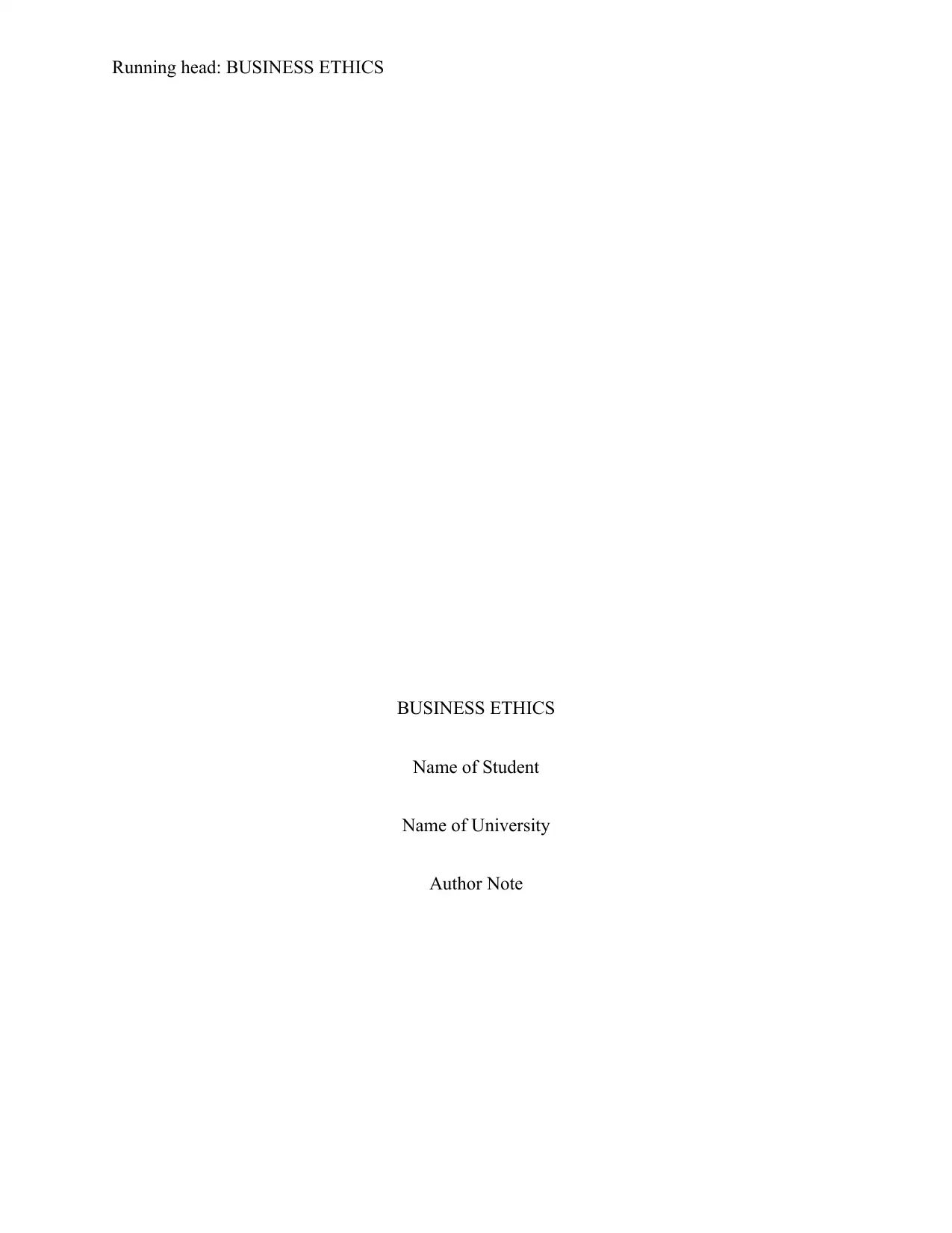
Running head: BUSINESS ETHICS
BUSINESS ETHICS
Name of Student
Name of University
Author Note
BUSINESS ETHICS
Name of Student
Name of University
Author Note
Paraphrase This Document
Need a fresh take? Get an instant paraphrase of this document with our AI Paraphraser
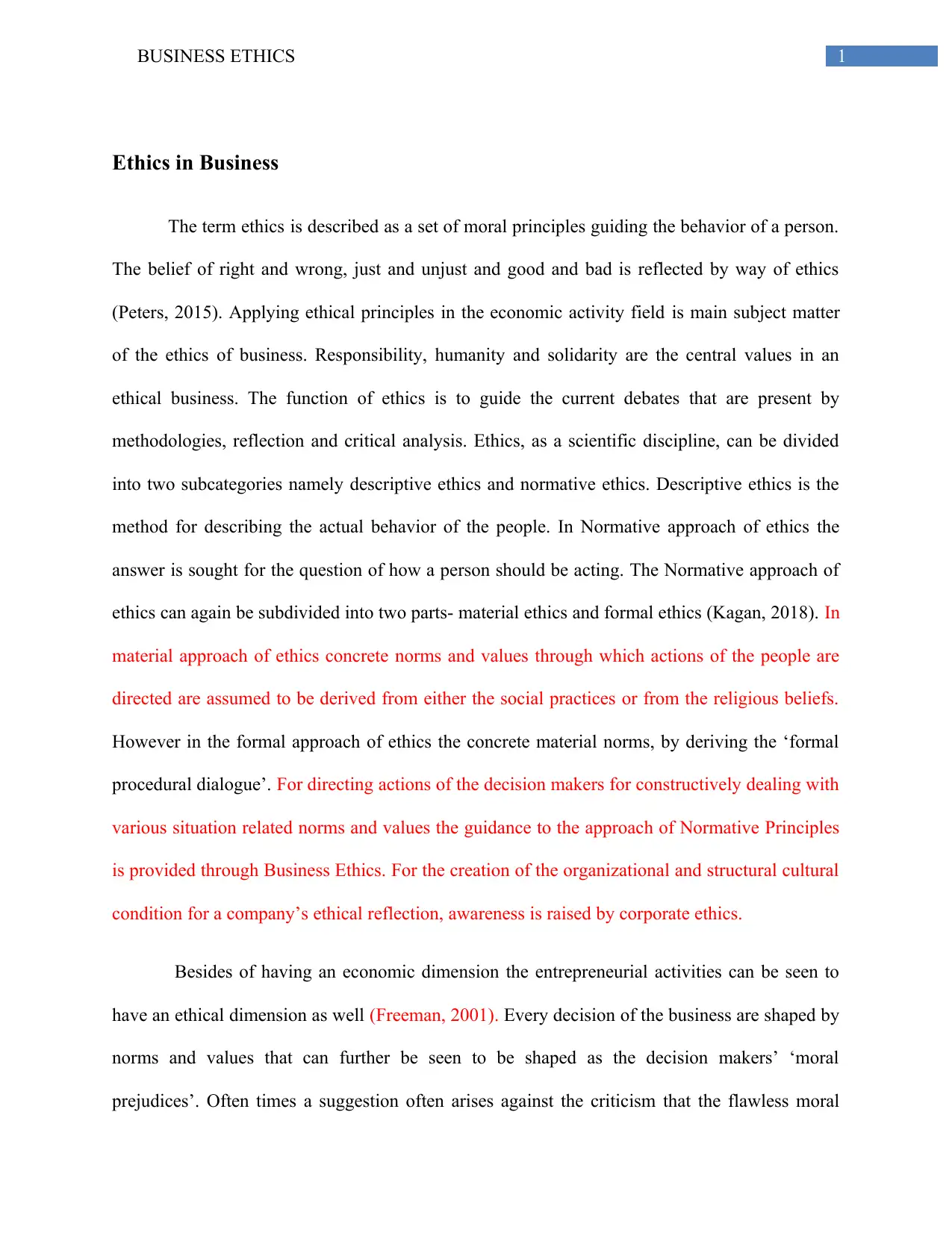
1BUSINESS ETHICS
Ethics in Business
The term ethics is described as a set of moral principles guiding the behavior of a person.
The belief of right and wrong, just and unjust and good and bad is reflected by way of ethics
(Peters, 2015). Applying ethical principles in the economic activity field is main subject matter
of the ethics of business. Responsibility, humanity and solidarity are the central values in an
ethical business. The function of ethics is to guide the current debates that are present by
methodologies, reflection and critical analysis. Ethics, as a scientific discipline, can be divided
into two subcategories namely descriptive ethics and normative ethics. Descriptive ethics is the
method for describing the actual behavior of the people. In Normative approach of ethics the
answer is sought for the question of how a person should be acting. The Normative approach of
ethics can again be subdivided into two parts- material ethics and formal ethics (Kagan, 2018). In
material approach of ethics concrete norms and values through which actions of the people are
directed are assumed to be derived from either the social practices or from the religious beliefs.
However in the formal approach of ethics the concrete material norms, by deriving the ‘formal
procedural dialogue’. For directing actions of the decision makers for constructively dealing with
various situation related norms and values the guidance to the approach of Normative Principles
is provided through Business Ethics. For the creation of the organizational and structural cultural
condition for a company’s ethical reflection, awareness is raised by corporate ethics.
Besides of having an economic dimension the entrepreneurial activities can be seen to
have an ethical dimension as well (Freeman, 2001). Every decision of the business are shaped by
norms and values that can further be seen to be shaped as the decision makers’ ‘moral
prejudices’. Often times a suggestion often arises against the criticism that the flawless moral
Ethics in Business
The term ethics is described as a set of moral principles guiding the behavior of a person.
The belief of right and wrong, just and unjust and good and bad is reflected by way of ethics
(Peters, 2015). Applying ethical principles in the economic activity field is main subject matter
of the ethics of business. Responsibility, humanity and solidarity are the central values in an
ethical business. The function of ethics is to guide the current debates that are present by
methodologies, reflection and critical analysis. Ethics, as a scientific discipline, can be divided
into two subcategories namely descriptive ethics and normative ethics. Descriptive ethics is the
method for describing the actual behavior of the people. In Normative approach of ethics the
answer is sought for the question of how a person should be acting. The Normative approach of
ethics can again be subdivided into two parts- material ethics and formal ethics (Kagan, 2018). In
material approach of ethics concrete norms and values through which actions of the people are
directed are assumed to be derived from either the social practices or from the religious beliefs.
However in the formal approach of ethics the concrete material norms, by deriving the ‘formal
procedural dialogue’. For directing actions of the decision makers for constructively dealing with
various situation related norms and values the guidance to the approach of Normative Principles
is provided through Business Ethics. For the creation of the organizational and structural cultural
condition for a company’s ethical reflection, awareness is raised by corporate ethics.
Besides of having an economic dimension the entrepreneurial activities can be seen to
have an ethical dimension as well (Freeman, 2001). Every decision of the business are shaped by
norms and values that can further be seen to be shaped as the decision makers’ ‘moral
prejudices’. Often times a suggestion often arises against the criticism that the flawless moral
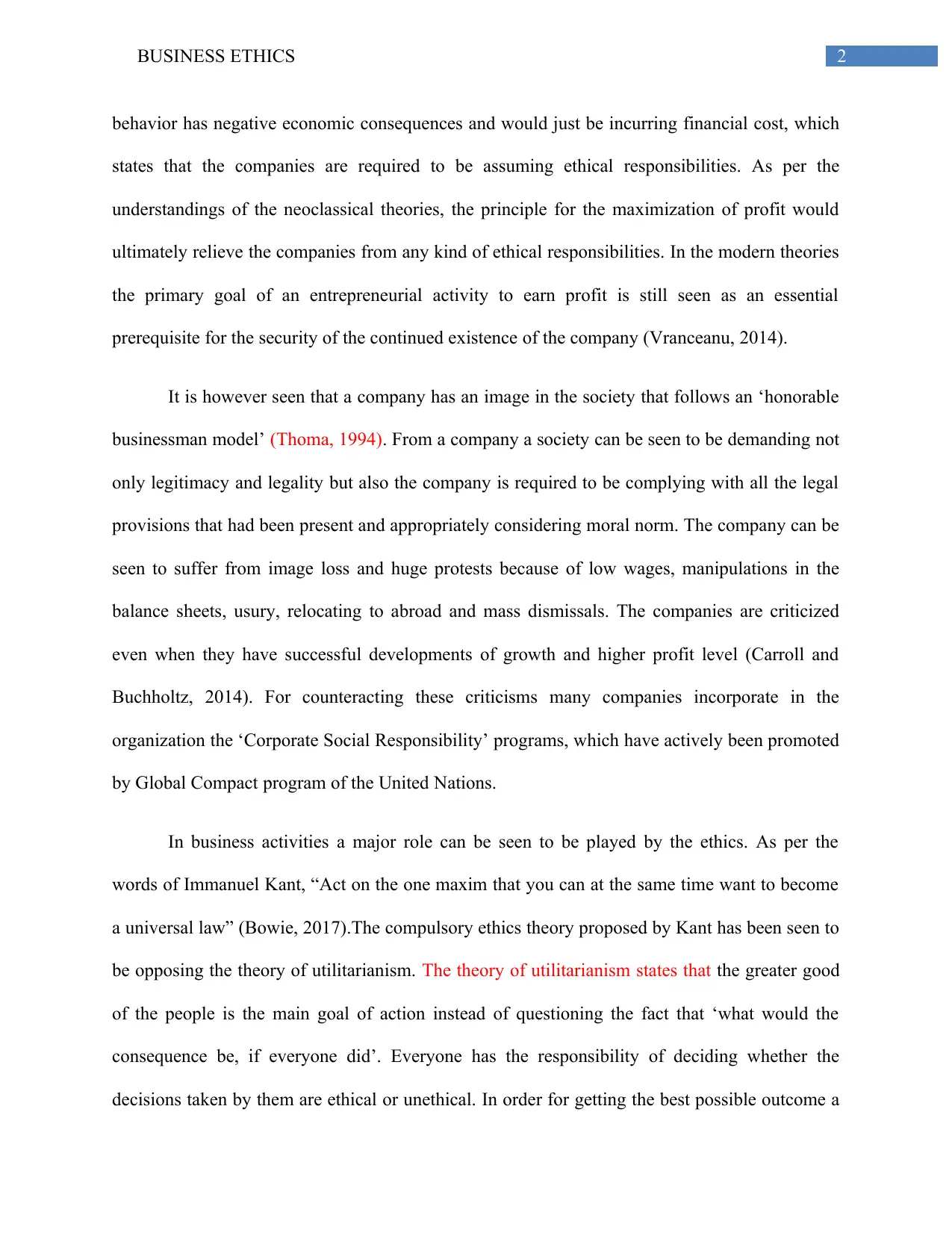
2BUSINESS ETHICS
behavior has negative economic consequences and would just be incurring financial cost, which
states that the companies are required to be assuming ethical responsibilities. As per the
understandings of the neoclassical theories, the principle for the maximization of profit would
ultimately relieve the companies from any kind of ethical responsibilities. In the modern theories
the primary goal of an entrepreneurial activity to earn profit is still seen as an essential
prerequisite for the security of the continued existence of the company (Vranceanu, 2014).
It is however seen that a company has an image in the society that follows an ‘honorable
businessman model’ (Thoma, 1994). From a company a society can be seen to be demanding not
only legitimacy and legality but also the company is required to be complying with all the legal
provisions that had been present and appropriately considering moral norm. The company can be
seen to suffer from image loss and huge protests because of low wages, manipulations in the
balance sheets, usury, relocating to abroad and mass dismissals. The companies are criticized
even when they have successful developments of growth and higher profit level (Carroll and
Buchholtz, 2014). For counteracting these criticisms many companies incorporate in the
organization the ‘Corporate Social Responsibility’ programs, which have actively been promoted
by Global Compact program of the United Nations.
In business activities a major role can be seen to be played by the ethics. As per the
words of Immanuel Kant, “Act on the one maxim that you can at the same time want to become
a universal law” (Bowie, 2017).The compulsory ethics theory proposed by Kant has been seen to
be opposing the theory of utilitarianism. The theory of utilitarianism states that the greater good
of the people is the main goal of action instead of questioning the fact that ‘what would the
consequence be, if everyone did’. Everyone has the responsibility of deciding whether the
decisions taken by them are ethical or unethical. In order for getting the best possible outcome a
behavior has negative economic consequences and would just be incurring financial cost, which
states that the companies are required to be assuming ethical responsibilities. As per the
understandings of the neoclassical theories, the principle for the maximization of profit would
ultimately relieve the companies from any kind of ethical responsibilities. In the modern theories
the primary goal of an entrepreneurial activity to earn profit is still seen as an essential
prerequisite for the security of the continued existence of the company (Vranceanu, 2014).
It is however seen that a company has an image in the society that follows an ‘honorable
businessman model’ (Thoma, 1994). From a company a society can be seen to be demanding not
only legitimacy and legality but also the company is required to be complying with all the legal
provisions that had been present and appropriately considering moral norm. The company can be
seen to suffer from image loss and huge protests because of low wages, manipulations in the
balance sheets, usury, relocating to abroad and mass dismissals. The companies are criticized
even when they have successful developments of growth and higher profit level (Carroll and
Buchholtz, 2014). For counteracting these criticisms many companies incorporate in the
organization the ‘Corporate Social Responsibility’ programs, which have actively been promoted
by Global Compact program of the United Nations.
In business activities a major role can be seen to be played by the ethics. As per the
words of Immanuel Kant, “Act on the one maxim that you can at the same time want to become
a universal law” (Bowie, 2017).The compulsory ethics theory proposed by Kant has been seen to
be opposing the theory of utilitarianism. The theory of utilitarianism states that the greater good
of the people is the main goal of action instead of questioning the fact that ‘what would the
consequence be, if everyone did’. Everyone has the responsibility of deciding whether the
decisions taken by them are ethical or unethical. In order for getting the best possible outcome a
⊘ This is a preview!⊘
Do you want full access?
Subscribe today to unlock all pages.

Trusted by 1+ million students worldwide
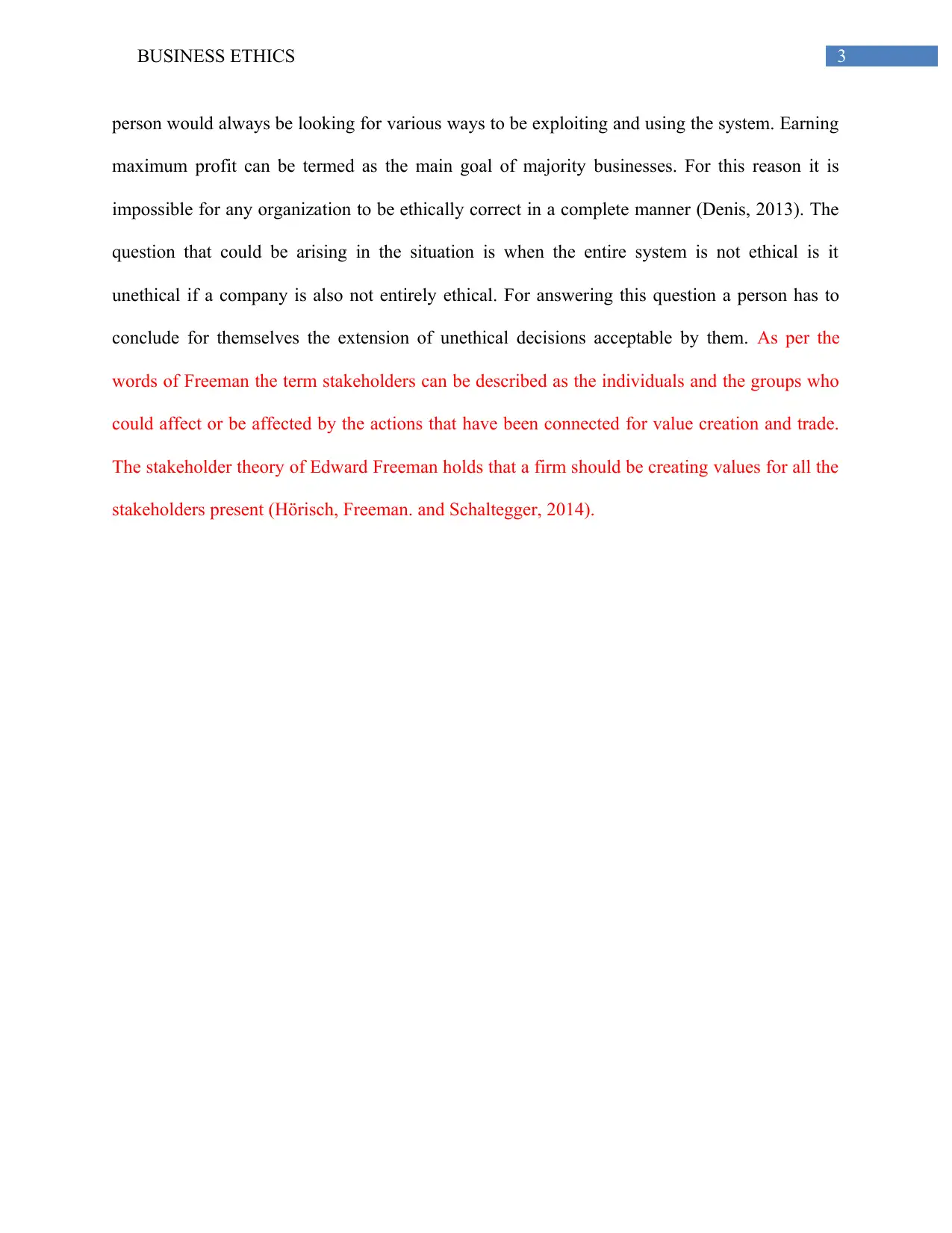
3BUSINESS ETHICS
person would always be looking for various ways to be exploiting and using the system. Earning
maximum profit can be termed as the main goal of majority businesses. For this reason it is
impossible for any organization to be ethically correct in a complete manner (Denis, 2013). The
question that could be arising in the situation is when the entire system is not ethical is it
unethical if a company is also not entirely ethical. For answering this question a person has to
conclude for themselves the extension of unethical decisions acceptable by them. As per the
words of Freeman the term stakeholders can be described as the individuals and the groups who
could affect or be affected by the actions that have been connected for value creation and trade.
The stakeholder theory of Edward Freeman holds that a firm should be creating values for all the
stakeholders present (Hörisch, Freeman. and Schaltegger, 2014).
person would always be looking for various ways to be exploiting and using the system. Earning
maximum profit can be termed as the main goal of majority businesses. For this reason it is
impossible for any organization to be ethically correct in a complete manner (Denis, 2013). The
question that could be arising in the situation is when the entire system is not ethical is it
unethical if a company is also not entirely ethical. For answering this question a person has to
conclude for themselves the extension of unethical decisions acceptable by them. As per the
words of Freeman the term stakeholders can be described as the individuals and the groups who
could affect or be affected by the actions that have been connected for value creation and trade.
The stakeholder theory of Edward Freeman holds that a firm should be creating values for all the
stakeholders present (Hörisch, Freeman. and Schaltegger, 2014).
Paraphrase This Document
Need a fresh take? Get an instant paraphrase of this document with our AI Paraphraser
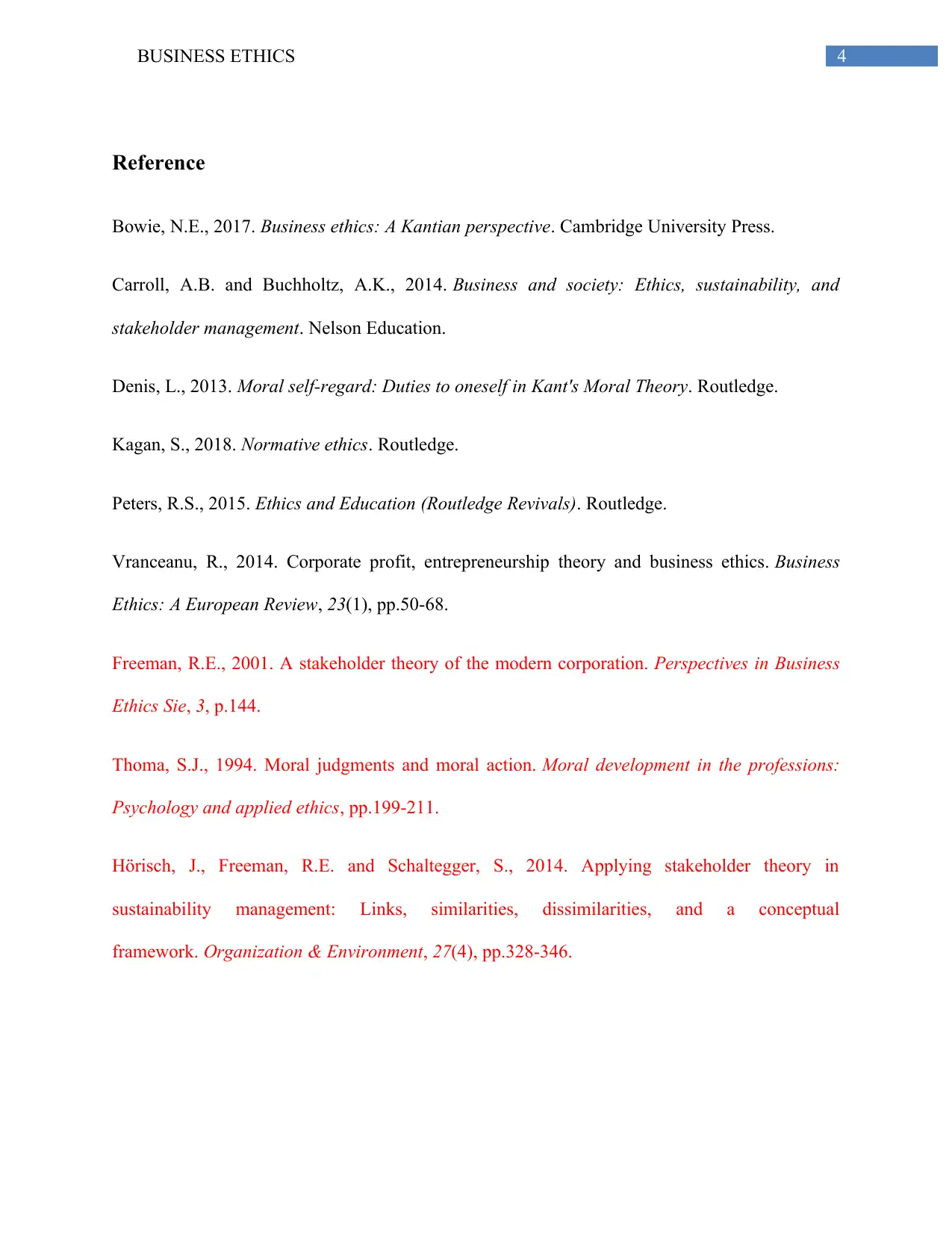
4BUSINESS ETHICS
Reference
Bowie, N.E., 2017. Business ethics: A Kantian perspective. Cambridge University Press.
Carroll, A.B. and Buchholtz, A.K., 2014. Business and society: Ethics, sustainability, and
stakeholder management. Nelson Education.
Denis, L., 2013. Moral self-regard: Duties to oneself in Kant's Moral Theory. Routledge.
Kagan, S., 2018. Normative ethics. Routledge.
Peters, R.S., 2015. Ethics and Education (Routledge Revivals). Routledge.
Vranceanu, R., 2014. Corporate profit, entrepreneurship theory and business ethics. Business
Ethics: A European Review, 23(1), pp.50-68.
Freeman, R.E., 2001. A stakeholder theory of the modern corporation. Perspectives in Business
Ethics Sie, 3, p.144.
Thoma, S.J., 1994. Moral judgments and moral action. Moral development in the professions:
Psychology and applied ethics, pp.199-211.
Hörisch, J., Freeman, R.E. and Schaltegger, S., 2014. Applying stakeholder theory in
sustainability management: Links, similarities, dissimilarities, and a conceptual
framework. Organization & Environment, 27(4), pp.328-346.
Reference
Bowie, N.E., 2017. Business ethics: A Kantian perspective. Cambridge University Press.
Carroll, A.B. and Buchholtz, A.K., 2014. Business and society: Ethics, sustainability, and
stakeholder management. Nelson Education.
Denis, L., 2013. Moral self-regard: Duties to oneself in Kant's Moral Theory. Routledge.
Kagan, S., 2018. Normative ethics. Routledge.
Peters, R.S., 2015. Ethics and Education (Routledge Revivals). Routledge.
Vranceanu, R., 2014. Corporate profit, entrepreneurship theory and business ethics. Business
Ethics: A European Review, 23(1), pp.50-68.
Freeman, R.E., 2001. A stakeholder theory of the modern corporation. Perspectives in Business
Ethics Sie, 3, p.144.
Thoma, S.J., 1994. Moral judgments and moral action. Moral development in the professions:
Psychology and applied ethics, pp.199-211.
Hörisch, J., Freeman, R.E. and Schaltegger, S., 2014. Applying stakeholder theory in
sustainability management: Links, similarities, dissimilarities, and a conceptual
framework. Organization & Environment, 27(4), pp.328-346.
1 out of 5
Related Documents
Your All-in-One AI-Powered Toolkit for Academic Success.
+13062052269
info@desklib.com
Available 24*7 on WhatsApp / Email
![[object Object]](/_next/static/media/star-bottom.7253800d.svg)
Unlock your academic potential
Copyright © 2020–2025 A2Z Services. All Rights Reserved. Developed and managed by ZUCOL.




